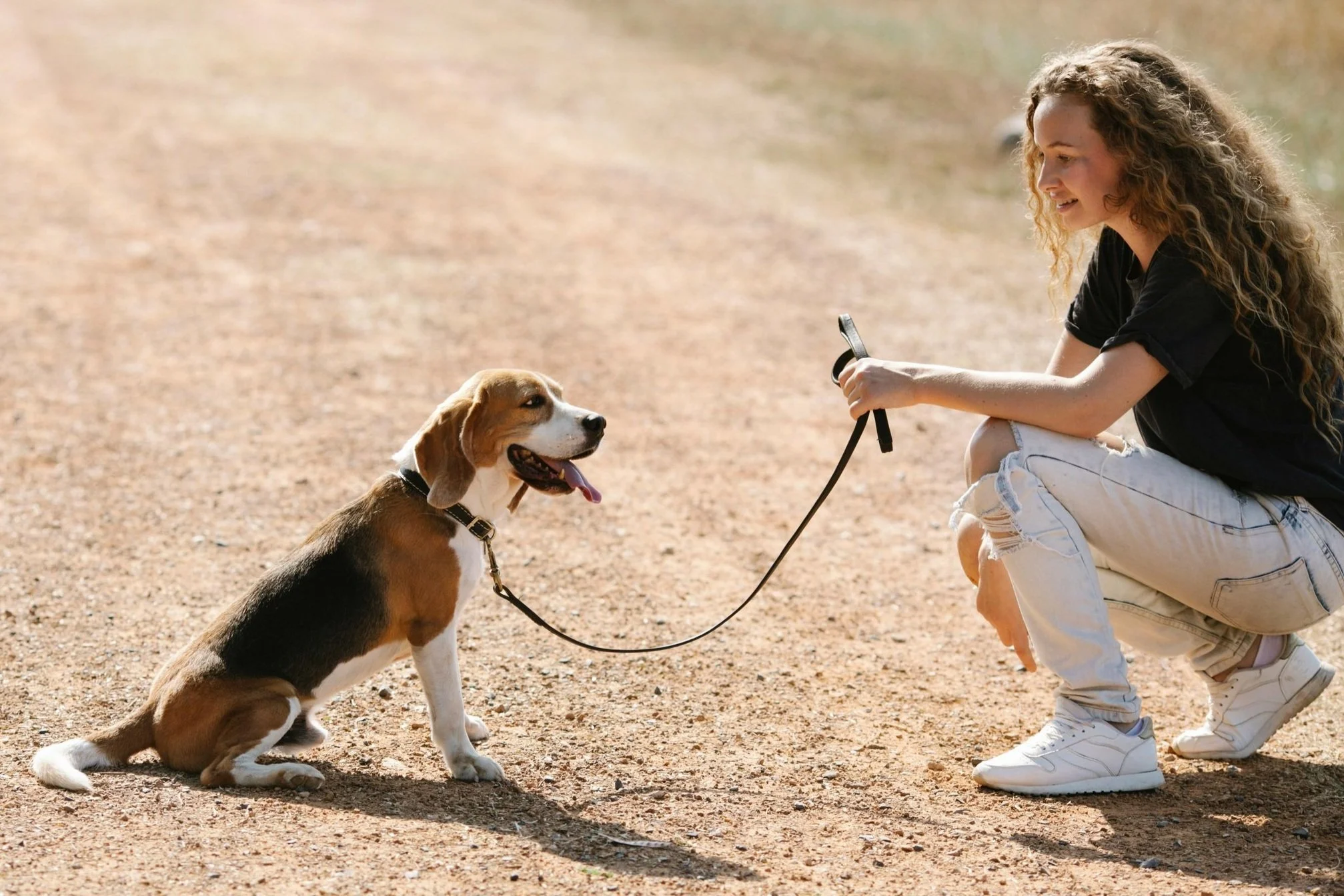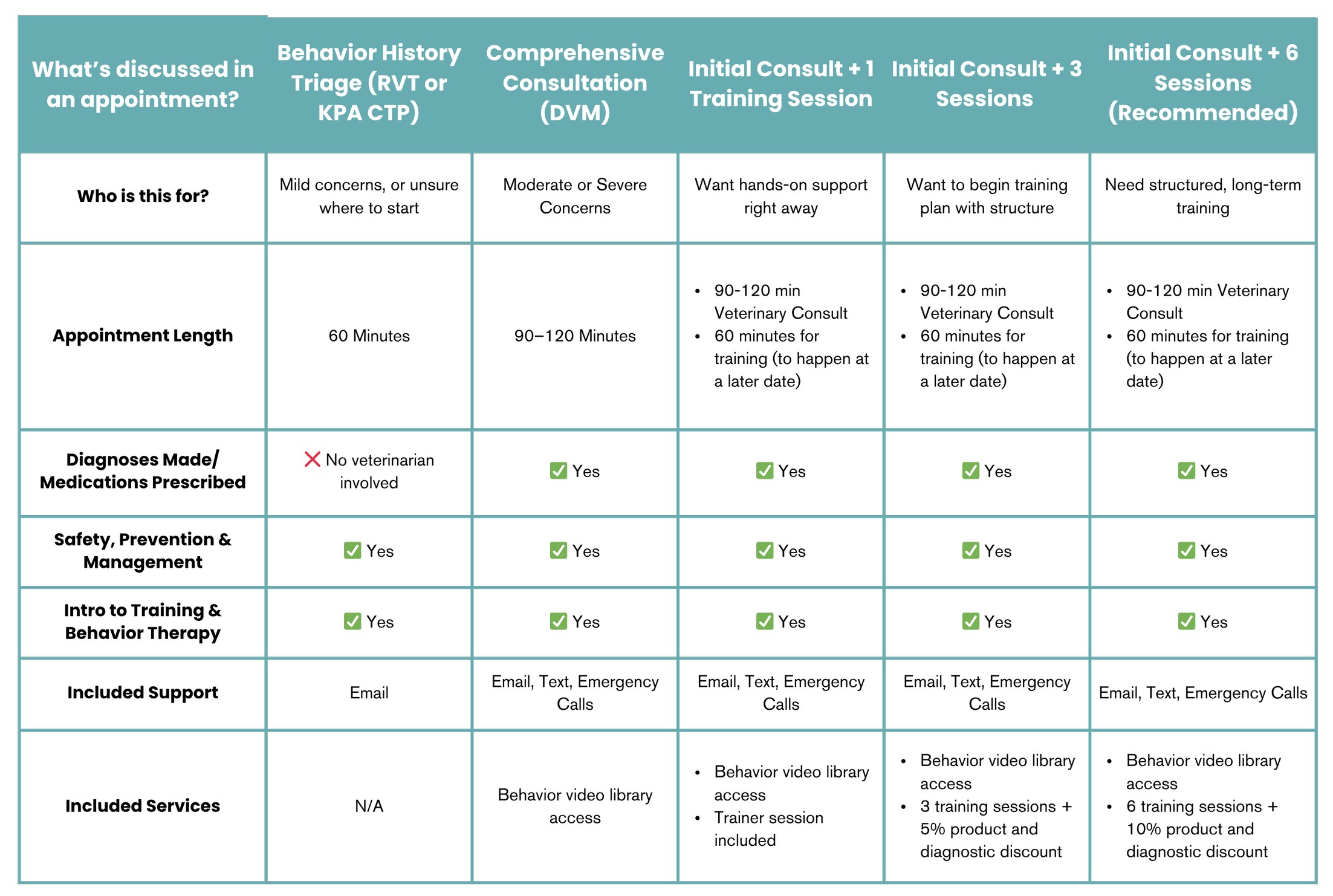Our services

How We Help
We treat dogs and cats with aggression, fear, anxiety, separation distress, noise phobias, and reactivity, as well as compulsive behaviors, house soiling, destructiveness, conflicts between pets and so much more.
Our team is focused on using veterinary knowledge, behavior science, and Fear Free techniques to understand the underlying cause of your pet’s behavior and develop an individualized plan.
Our goal is simple: a safer and happier pet, a calmer home, and a stronger bond.
Veterinary Behavior Consults
Our veterinarians review your pet’s medical and behavioral/emotional history , current medications, daily routines, and behavior patterns to identify contributing factors to emotional distress. We assess whether behavioral medication may help and create a personalized care plan to support both emotional well-being and behavior change.
We’re here to support you with expertise and empathy to support your pet’s long-term well-being.


1. Before Your Visit
What You Prepare
- We will request your pet's medical history, including current medications, at least 72 hours prior to the appointment. If you prefer us not to do this, please notify us in advance.
- If possible, email photos of your home environment and videos of concerning behaviors to enhance safety. However, please do not do anything that could endanger yourself, others, or your pet(s) while capturing this content.
- Recent blood work (within the last 3 months) is recommended but not required and should be included in the medical history.
How We Prepare
- Our lead veterinarians, Dr. Adele Hilliard and Dr. Jill Bradshaw, conduct a comprehensive review of your pet's medical history, including past diagnoses, treatments, medications, and behavioral concerns, while also considering age, breed, and overall health.
- They carefully review records in advance to ensure each appointment is focused, thorough, and tailored to your pet’s unique needs.
- This in-depth assessment helps uncover any underlying medical issues that may be contributing to behavioral concerns, allowing us to provide care that is informed, compassionate, and effective.

2. In-Depth Behavior Consultation
What To Expect
- During your in-clinic consultation, our lead veterinarians, Dr. Adele Hilliard and Dr. Jill Bradshaw, focus on understanding your pet's behavioral challenges, including aggression, fear, anxiety, noise phobias, and and so much more.
- They thoroughly review your pet’s history and medical records and evaluate any underlying health conditions that may be contributing to these concerns, helping to ensure a thoughtful and well-rounded assessment.
- Based on their findings, they provide a diagnosis, long-term prognosis, and clarify which behaviors are likely to improve and which may be more complex.
- Additional recommendations for diagnostics are made if needed.
- Their comprehensive approach allows them to create a personalized treatment plan tailored to your pet’s medical, behavioral needs, initial consultations last 90–120 minutes, and and so much more.

3. After Your Visit
Detailed Treatment Plan
- After the consultation, our lead veterinarians, Dr. Adele Hilliard and Dr. Jill Bradshaw, dedicate considerable time to developing a detailed treatment plan tailored to your pet.
- The plan includes practical handouts and notes to support your pet’s progress at home, along with recommended behavioral and environmental modifications.
- When appropriate, potential medication options are also considered to ensure your pet receives the most effective and compassionate care.
Medication Progress Rechecks
- Medication progress rechecks (30–45 minutes) are done virtually about 4–6 weeks after the initial consultation.
- We assess your progress and make any needed adjustments to your treatment.
- Ongoing check-ins take place every 6 months virtually, with a thorough 60–90 minute review.
- Continuous, compassionate support is provided to help your pet thrive emotionally and behaviorally.
Free Training Videos
- Included with every consult and training intake, our foundational video series helps you begin behavior support right away at home.
- Topics include interpreting canine and feline body language, setting up safe zones for rest and decompression, teaching a reliable settling cue, and step-by-step responses to common behavior challenges like barking, jumping, or avoidance.
- These short, focused videos provide clear, actionable guidance to implement before your personalized behavior or treatment plan begins.

Comprehensive Behavior Modification Sessions
Led by our licensed veterinary technicians, our sessions focus on helping your pet feel safer, more confident, and more in control of their environment.
Depending on your pet’s needs, behavior modification may include techniques such as muzzle training, cooperative care, desensitization to triggers, or building tolerance for handling, vet visits, or grooming.
We also coach you on how to communicate more clearly with your pet, reinforce calm behavior, and respond effectively when your pet feels overwhelmed.
Our sessions can begin after a veterinary behavior consult or serve as a starting point for pets with mild behavior concerns. All sessions are personalized, goal-oriented, and rooted in positive reinforcement.

Initial behavior consult + modification is recommended for best results
Pairing a behavioral consultation with behavior modificaiton provides the most effective and lasting support for your pet.
When a veterinarian and a technician work together from the beginning, your pet benefits from a fully coordinated plan, much like having a psychiatrist and therapist collaborating to help ensure comprehensive care.
Not Sure Where to Start?
Start with a 20-minute call with one of our experienced vet techs.
We’ll help you figure out the best next step for your pet’s needs.
Benefits of Working with a Veterinary Clinic Focusing on Behavior
FAQs
What makes a vet focusing on behavioral care different from an animal trainer?
- Advanced Medical Training – A vet focusing on behavioral care has advanced medical education, allowing them to diagnose and treat health issues that may contribute to behavior problems.
- Medical & Behavioral Approach – They have the ability to address both the medical and behavioral aspects. A large percentage of behavioral disorders have medical roots that contribute to issues, even if they aren’t apparent at home.
- Ability to Prescribe Medication – A vet focusing on behavioral care can prescribe medications when necessary to support treatment, while trainers focus on teaching behaviors and commands.
- Diagnostic Expertise – They know which specific medical tests to recommend in order to identify underlying health conditions that may affect behavior.
- Therapy & Treatment Plans – Their approach often combines therapy, behavior modification, and medical interventions for lasting results.
Do you always use medication?
Not always! A common misconception is vets focusing on behavioral care rely on medication for every case. While it can be helpful in certain situations, it’s never prescribed lightly.
- Medication is a tool, not a solution – When recommended, it’s to support your pet’s progress, not to sedate them.
- Supports learning & well-being – It helps reduce anxiety and makes pets more receptive to training, especially when stress has blocked their ability to learn.
- Part of a bigger plan – Medication alone isn’t enough. We combine it with behavior modification, training, and lifestyle changes for lasting results.
- Safety first – Side effects are rare, and we closely monitor your pet’s response to support their well-being.
Every pet is different, and our approach is always tailored to their unique needs!
How fast can I expect to see progress?
Every pet is unique, so progress depends on factors like the severity of their behavior, consistency in training, and their individual response to treatment.
- Some pets show improvement within a few weeks, especially with structured guidance and management.
- For more complex cases, progress may take months, as behavioral changes require patience and consistency.
- Medication (if recommended) can take time to reach full effectiveness, and adjustments may be needed along the way.
Our goal is lasting, meaningful change, and we’ll support you throughout the process to ensure the best outcome for your pet.
Do I need a referral from my regular vet?
No, a referral is not required! However, we strongly recommend:
- Sending your pet’s veterinary records to our email in advance for review.
- Having recent bloodwork (within the last 3 months) to ensure a thorough evaluation.
This helps us get a complete picture of your pet’s health and provide the best possible care.
Will muzzle training have a negative effect on my dog?
Not at all! When introduced properly, muzzle training can be a positive and stress-free experience for your dog.
- Muzzles are a safety tool, not a punishment – They protect both your dog and others in certain situations, like vet visits or high-stress environments.
- Prevents negative associations – Proper training ensures your dog sees the muzzle as a normal and even rewarding experience.
- Encourages confidence – Many dogs feel more relaxed when they and their owners feel safe in unpredictable situations.
With positive reinforcement, your dog can learn to wear a muzzle comfortably, just like a harness or collar!



.webp)
.webp)
.webp)
.webp)
.webp)














